Meet the Young Saudi Social Entrepreneurs who are Helping Achieve the 2030 Agenda & Saudi Arabia’s 2030 Vision
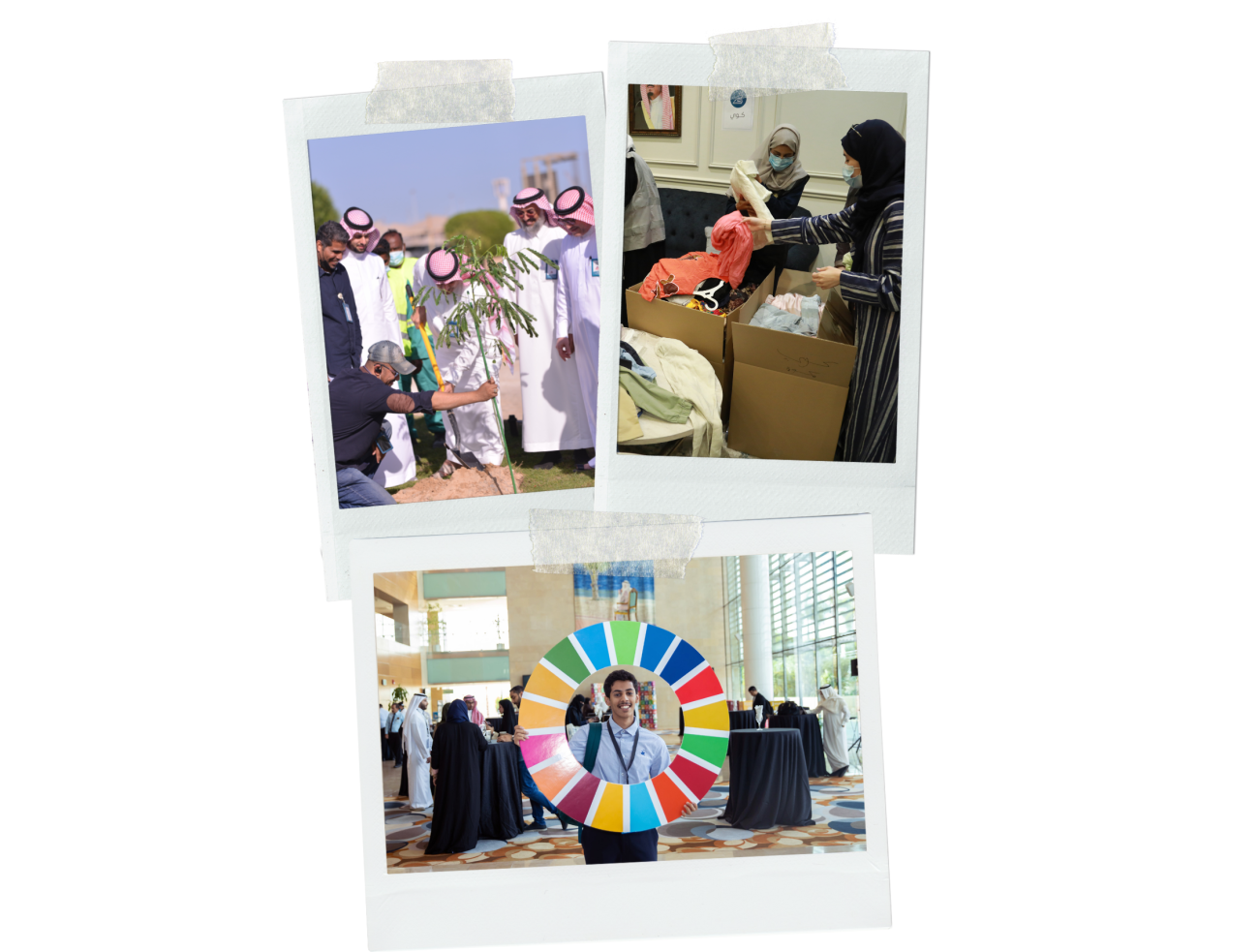
As the impact of climate change intensifies with each passing year, more and more young Saudis are joining the movement for positive change.
With a passion for the environment, they direct their entrepreneurial spirit towards change, raising awareness and motivating others to take action!
The UN in Saudi Arabia met with young Saudi entrepreneurs to learn about their initiatives and how they contribute to sustainability and climate action. They shared their experiences and encouraged others to take action for a cleaner, cooler, and happier world!
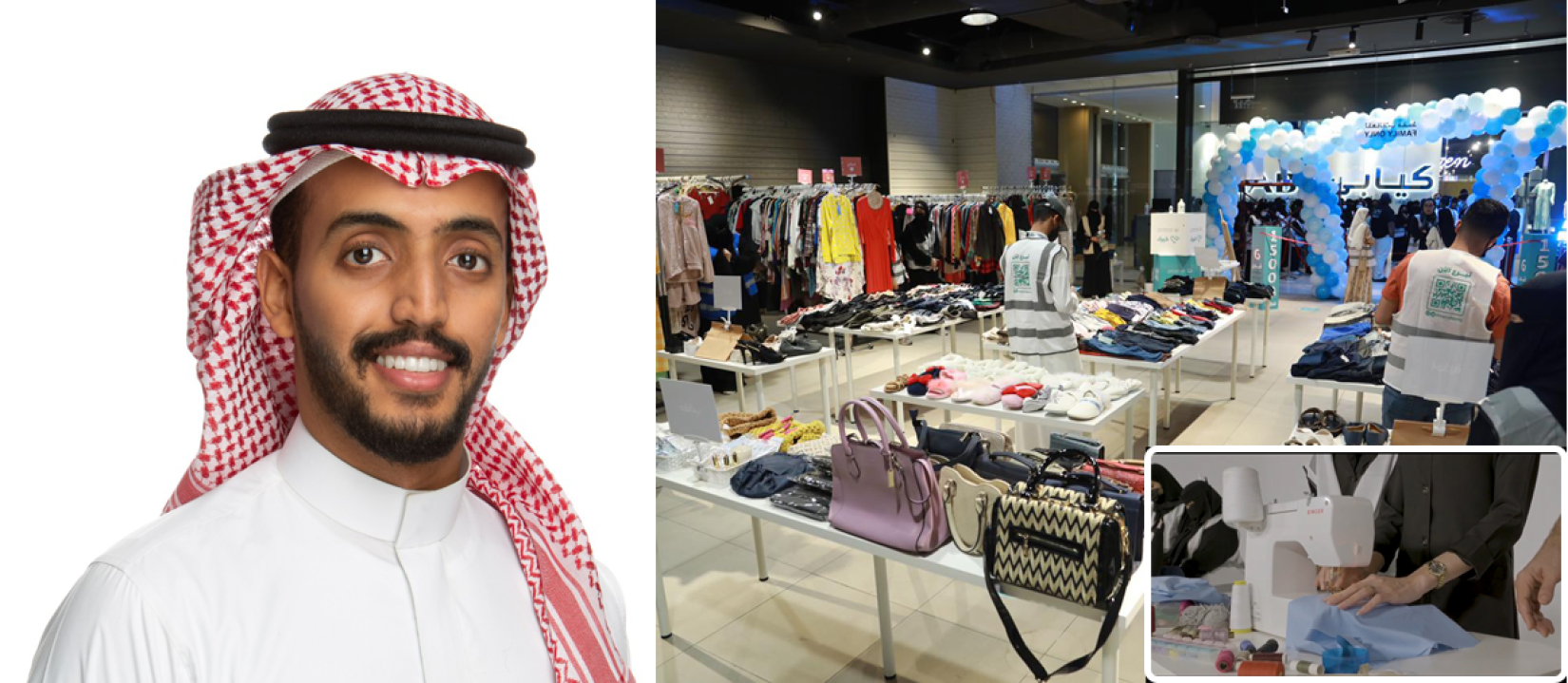
Ali Bakhallagi, Social Entrepreneur & Founder of Tadweem, Jeddah, Saudi Arabia.
Ali is a young Saudi entrepreneur from the city of Jeddah who is passionate about business and the environment. Ali has diverse exposure with a background in supply chain management, retail, and e-commerce in national and international organizations. Through research, he noticed the lack of specialized business models in the Kingdom of Saudi Arabia for the secondhand apparel market, which inspired him to start “Tadweem.”
He aspires for Tadweem to become a trailblazer in recycling, sustainable fashion, and waste management business models in the Kingdom. He aims to inspire other environmentally friendly companies in waste management and recycling and help accelerate the Kingdom’s efforts towards environmental sustainability and a green economy.
Can you tell us about your project, why, and how it started?
“Tadweem” is a social investment company in the arena of recycling. It supports the environment through the concept of the circular economy.
Tadweem was created to introduce the concept of sustainable fashion to Saudi Arabia and encourage Saudis to practice sustainable behavior in their daily lives. The main reason for starting Tadweem is its belief in its role in developing the community and enriching the environment and ecosystem in KSA and the world as a whole.
Tadweem works by preparing used clothes—sorting, cleaning, and sterilizing them so they can be used again. Then, we resell them on appropriate platforms and exhibitions and recycle the waste into raw materials for local use.
In the coming stages, we will expand to broader waste management, sustainable fashion, and recycling models to achieve the concept of a circular economy.
The word Tadweem is a hybrid of two Arabic words, “Tadweer” which means recycling, and “Tadweem” which means sustainable.”
What do you hope to achieve in the future with Tadweem, and how can it add to the environmental efforts in Saudi Arabia?
At Tadweem, we aspire to become trailblazers in recycling, sustainable fashion, and waste management business models in the Kingdom. We aim to inspire other environmentally friendly companies in these domains and ultimately support achieving environmental sustainability.
How is Tadweem supporting environmental sustainability and achieving global goals?
Tadweem contributes to the achievement of the following Sustainable Development Goals:
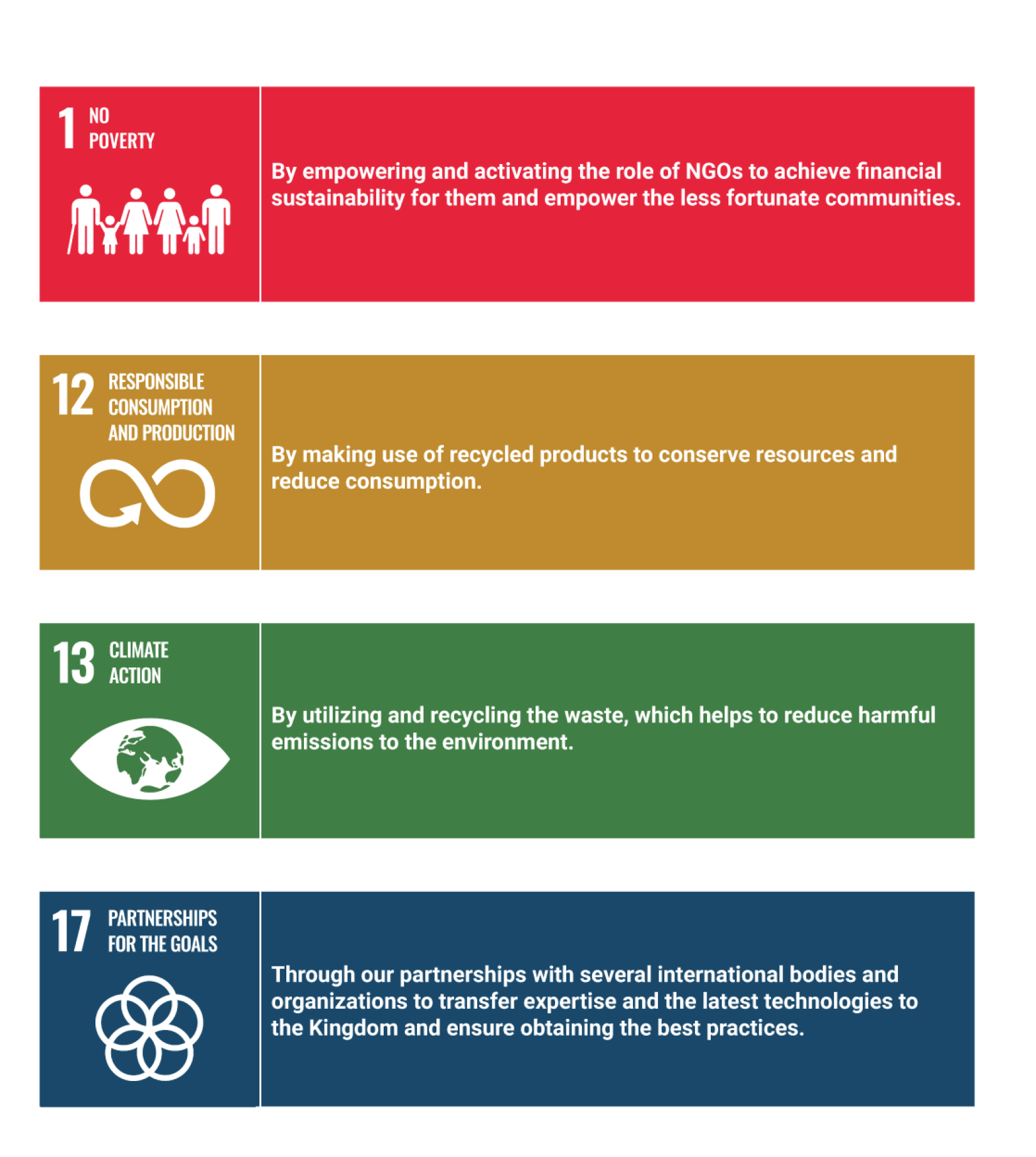
What advice would you give social entrepreneurs to sustain impactful success?
Dig deep into societal issues and challenges. Have a solution-oriented mindset and be innovative!
I would also say, seize the opportunity of local resources and government support.
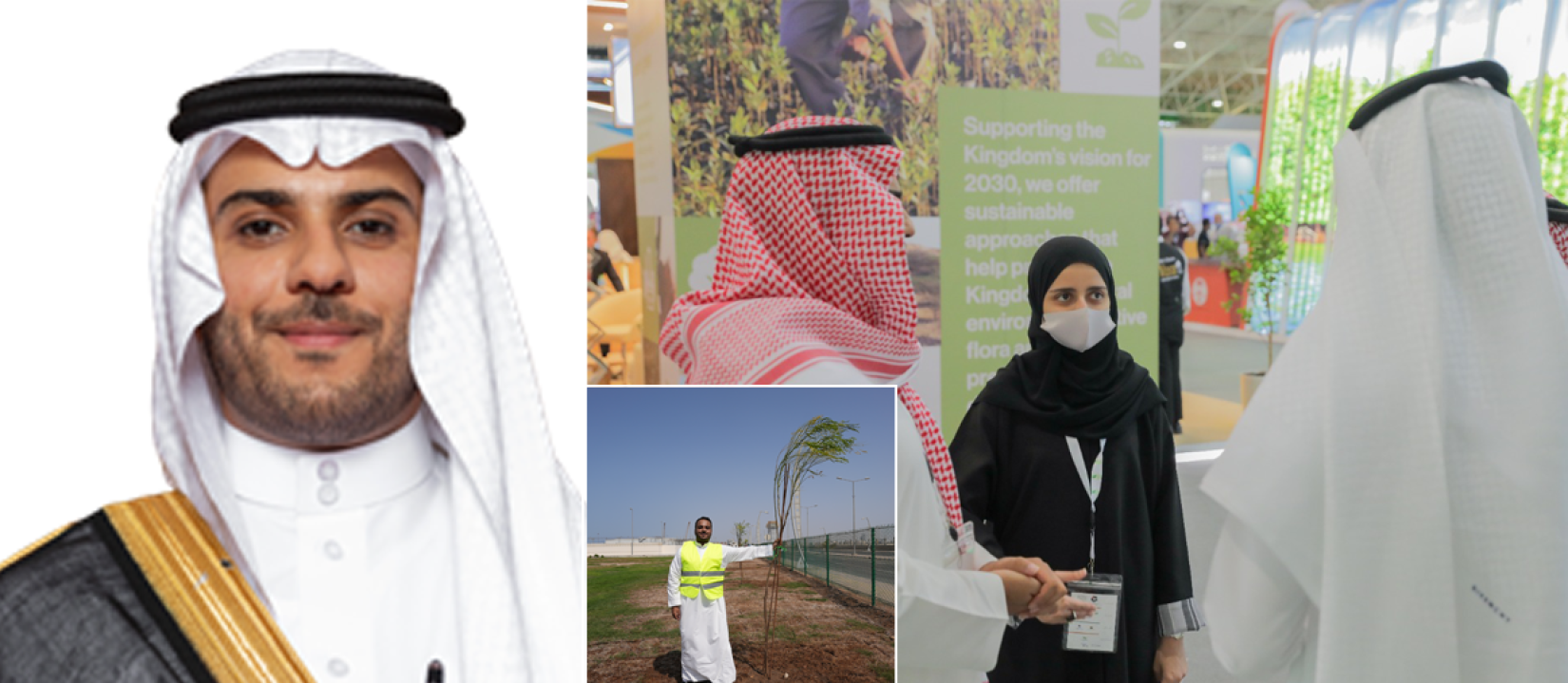
Mohammed Alkhalid, NABATIK Founder, Dhahran, Saudi Arabia
Mohammed comes from a mechanical engineering background. He started “NABATIK” in 2019 to make planting trees affordable for both individuals and corporations. Mohammed believes in innovative solutions to global challenges, which is why he started NABATIK with a focus on utilizing the latest technological trends. Mohammed, as a young leader, has been nominated as a finalist in the Young Champion of Earth award by the United Nations Environment Programme, the highest environmental honor for youth, for his contribution to integrating technology with Nature-based Solutions to offset carbon emissions as a means of combating climate change.
Can you tell us about your project, why, and how it started?
NABATIK is the first climate technology startup in the Kingdom. It provides Nature-Based Solutions in Saudi Arabia to combat climate change through forestry and urban tree planting. We developed a unique business model that minimizes the cost of planting trees to incentivize companies to plant trees with us and contribute to the Saudi Green Initiative goal of 10 billion trees in Saudi.
My love for planting trees was instilled in me at a young age. When I was seven, my father took me to a barren land that was part of a new residential area and handed me a shovel, a potted plant, and a bottle of water. He helped me dig a hole in the dirt, and then, carefully, I placed the plant in its new home; after that, we took turns watering it. I felt a sense of accomplishment and was filled with hope. My father said we had to go, but I wasn't done admiring my little plant. "Don't worry about it," he said. "The workers here will water it and take care of it." And off we went. It took me some time, but gradually I stopped thinking about it.
Twenty years later, I was passing by an area that looked familiar. I parked my car and walked into the same barren land, empty as I remembered. Until I stumbled upon a tree standing by itself. I looked up and was instantly mesmerized by this magnificent tree that stood tall before me; its branches blooming with lush green leaves, casting a shadow around me, embracing me.
"This is my tree," I said to myself. It was the best feeling in the world.
That day, I made a pledge to help plant 1 million trees by 2023 to support the “Saudi Green Initiative” by engaging communities in an innovative way.
How does NABATIK contribute to environmental sustainability?
Planting millions of trees in the harsh climate of the Arabian Peninsula is quite a challenge due to the limited water resources, extreme temperatures, and the nature of the soil. It requires a tremendous effort to plant and maintain such a high number of trees. We realized that we must rely on the good intentions of people and the power of the latest technologies to overcome that challenge.
At NABATIK, we focus on enabling and emphasizing the importance of social responsibility, especially at the corporate level. Capitalizing on the corporate social responsibility trend is a key source of funding for the afforestation initiative. We enable big companies to offset their carbon emissions in the region by allowing them to plant trees using our platform. The benefit of using our platform is that they can monitor and keep track of the actions they have taken as we ensure that each tree is accounted for.
NABATIK contributes to the achievement of the following Sustainable Development Goals:
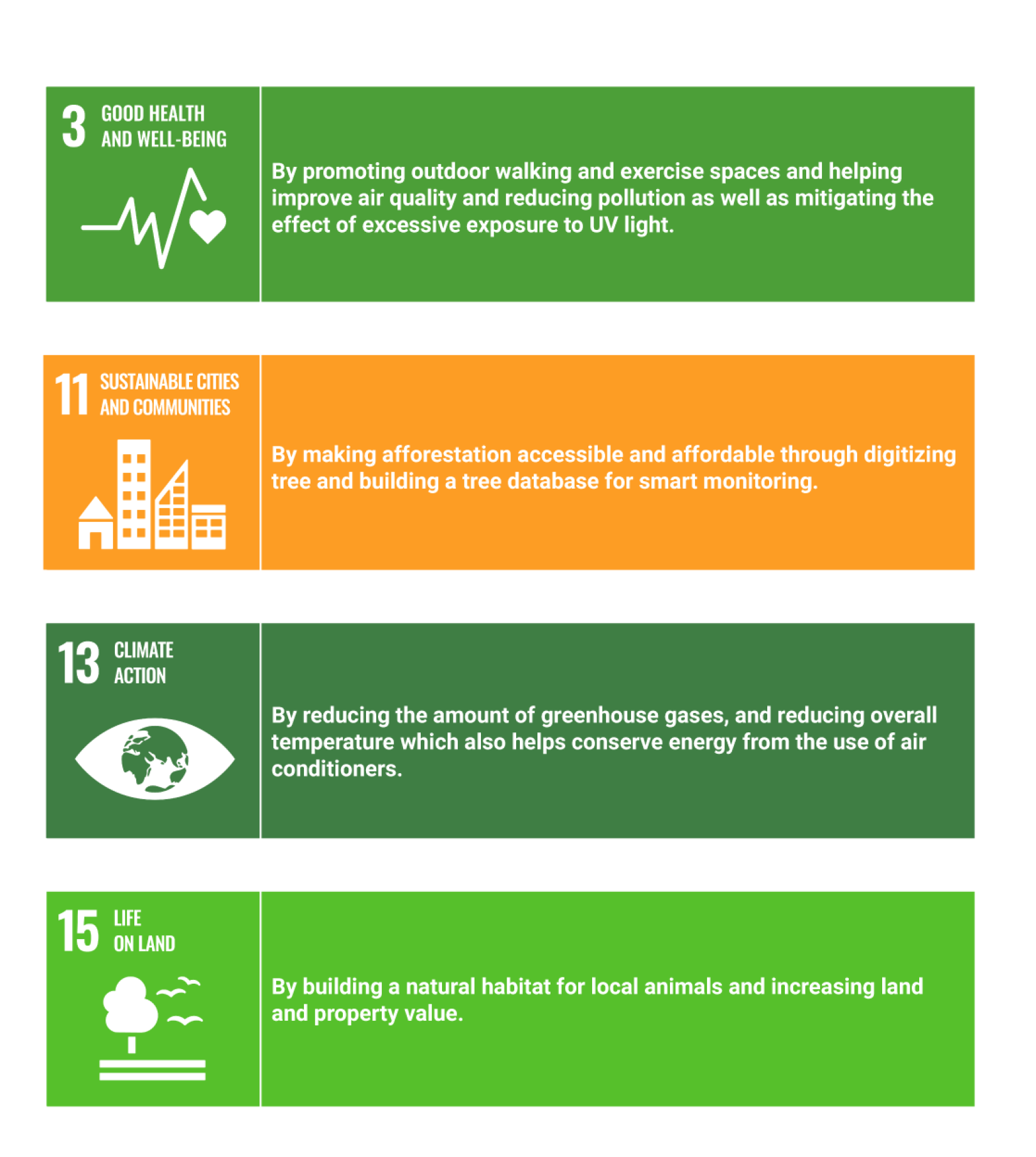
In your opinion, why is social entrepreneurship vital to the Sustainable Development Goals?
We must realize that we should not take our quality of life for granted. Future generations might not have the same privileges that we are enjoying. It is our responsibility to leave a better planet for our children and great-grandchildren. It starts by prioritizing our environment and society over profit, and this is social entrepreneurship. That does not mean you should not build a profitable business, but it means that a profitable business that is environmentally positive and socially engaging is a more sustainable business.
What advice would you give social entrepreneurs to sustain impactful success?
“Do good and good things will come to you.” When you look at global challenges, such as the SDGs, you will find tons of opportunities. Each challenge is an invitation to you to find a solution. Such solutions will not only change people’s lives and protect the planet; they can also be very profitable businesses.
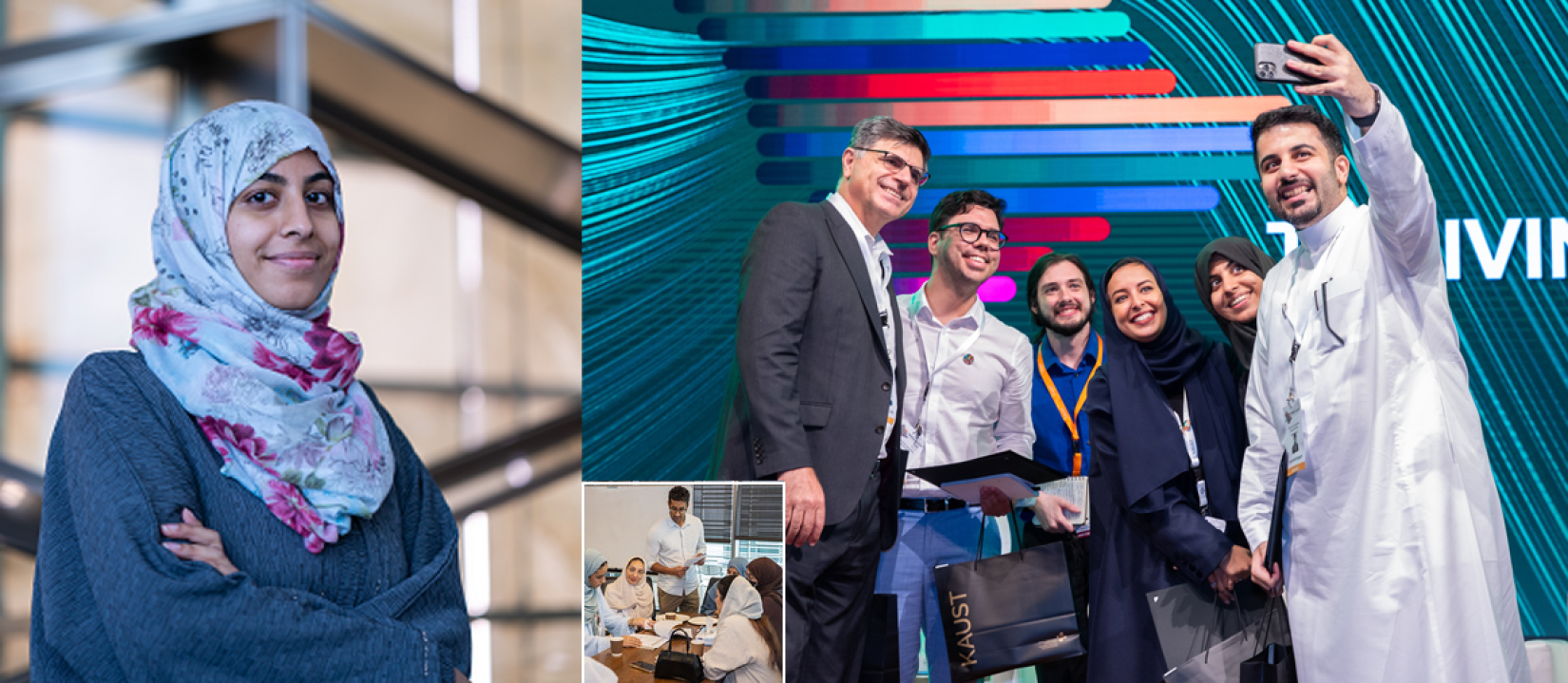
Eman Alhajji, Founder and President of Saudi Youth for Sustainability, Thuwal, Saudi Arabia
Eman is a Ph.D. candidate innovating nanocarbon materials for energy storage at King Abdullah University of Science and Technology (KAUST). She is passionate about sustainability and believes that empowering others to act is the best action towards achieving sustainability.
Can you tell us about your project, why, and how it started?
The Saudi Youth for Sustainability (SYS) is a youth-led national organization that aims to empower and connect young leaders to drive positive changes towards a sustainable future across the Kingdom of Saudi Arabia.
In Fall 2019, I chose my elective courses during my graduate journey at KAUST. I chose Sustainable Engineering taught by Prof. Mani Sarathy and Energy and the Environment taught by Prof. Tad Patzek. These two courses awakened me to the urgent reality of the world. I was filled with both logical and emotional drive to act; my brain and heart felt like they were on fire. My only hope was the goodness of humanity, and all I wanted to do was to empower others to act and collaborate.
When Dr. Ana Margarida, the head of KAUST sustainability, organized ‘Let’s Talk about Sustainability’ in November 2019, I felt it was the door to stop complaining and start embracing change. I was truly fortunate to meet other passionate and self-driven people to establish a platform to drive a positive impact. A very diverse group of us bonded in a respectful, transparent, dynamic, and open manner. The first sustainability organization was born with me as the founding president.
Despite the pain we experienced throughout the pandemic year of 2020, we showed how our collective efforts make us resilient. We were the most active student organization on campus. We initiated the Sustainability Seminar Series, Campus Tours, Weeks of Awareness, Sustainability Movie Nights, Sustainability Behavioral Challenge, Earth Day Celebration, Global University Climate Forum Project, and many others. We participated in both local and international organizations. It seemed to me that all forces came together to create this epic student organization.
We aspired to expand this youth momentum to other universities. By establishing this society, we aim to connect with other young change-makers from Saudi Arabia to develop novel approaches to tackle persistent critical issues and initiate a network that will unite our forces. We want to raise our voices to policymakers to meet the younger generation’s demand for sustainable development. SYS was born to enable us and all youth in the Kingdom to thrive together for the better.
How does the Saudi Youth for Sustainability Social Club contribute to environmental sustainability?
At Saudi Youth for Sustainability, we aspire to unite youth actions towards living in harmony with our mother Earth in a thriving and sustainable way.
Our four missions are to:
- Create seeds of student sustainability groups in Saudi universities and empower bottom-up changes.
- Promote national and international networking of youth change-makers in Saudi Arabia to scale sustainable solutions.
- Foster knowledge sharing in sustainable development and UN-SDGs.
- Advance and disseminate best practices of youth sustainability initiatives.
SYS contributes to the achievement of the following Sustainable Development Goals:
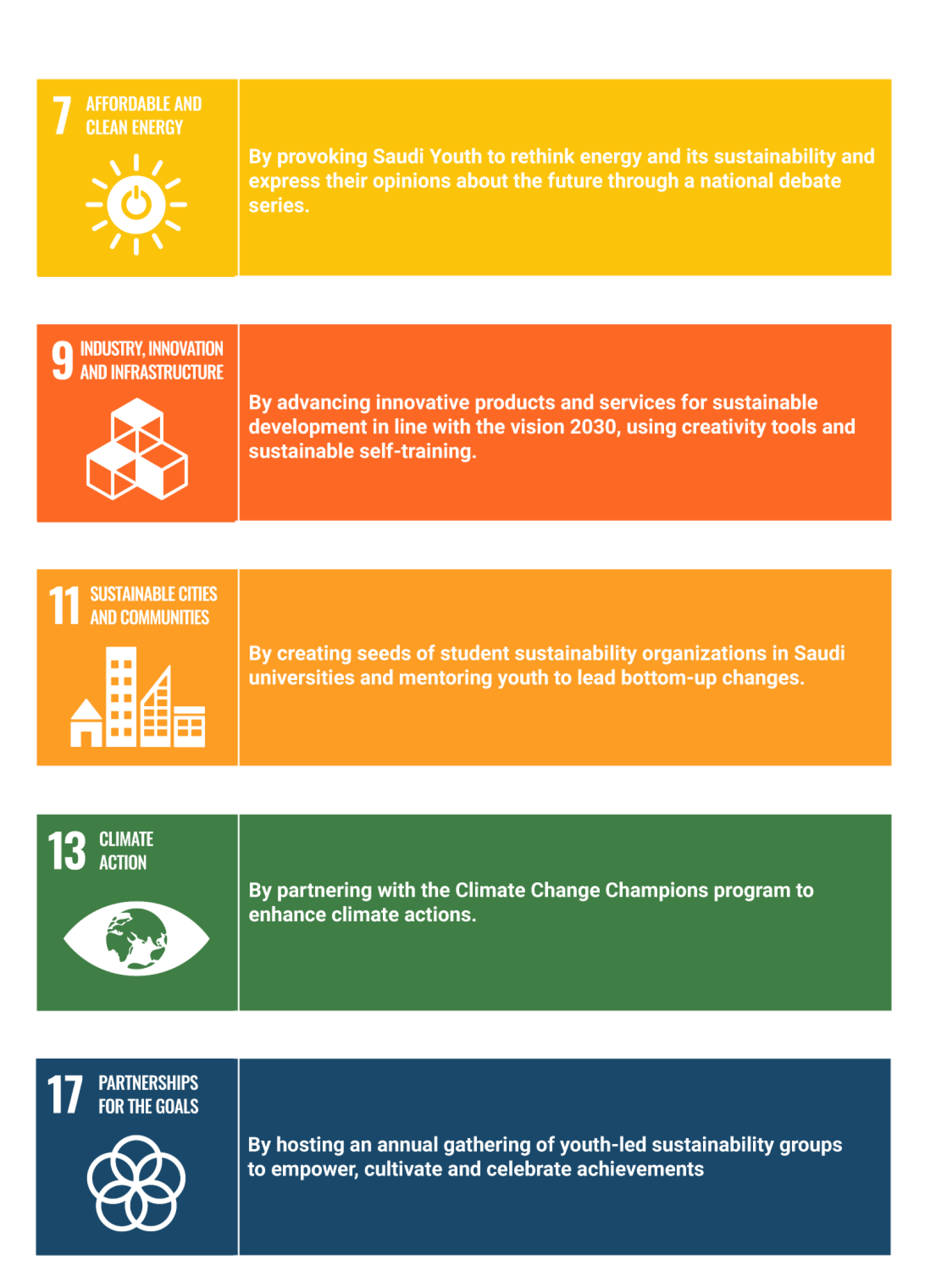
We also hope to support the efforts made in Saudi Arabia on environmental sustainability through various ways:
- Build an online hub for engagement and knowledge sharing on sustainability initiatives.
- Initiate joint efforts for sustainable solutions on university campuses and nearby communities.
- Hold collaborative events and initiatives for sustainability engagement (e.g., sustainability seminar series, upcycling workshops, weeks of awareness, and tours).
- Host an annual gathering of youth-led sustainability groups to empower, cultivate, and celebrate achievements.
What are your priorities for the remainder of this year?
We aim to bring a groundbreaking experience during the inaugural annual conference of Saudi Youth for Sustainability, which will take place on June 19th and 20th, 2022, at King Abdullah University of Science and Technology (KAUST) in Thuwal, Saudi Arabia. The theme of this year’s annual conference is Thriving Together, in which we explore how Saudi youth can be active contributors to Vision 2030 and SDGs through advocacy, education, and technology. We will also continue the leaders’ program and foster more youth clubs across Saudi universities.
What advice would you give social entrepreneurs to sustain impactful success?
Always ask these three questions: Is the project economically viable, socially equitable, and environmentally bearable?









